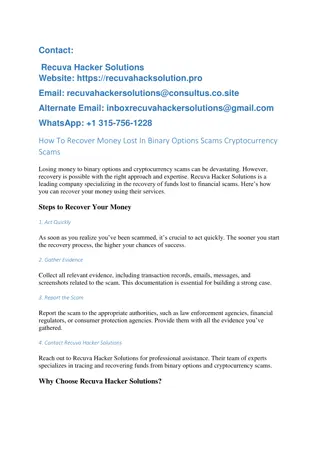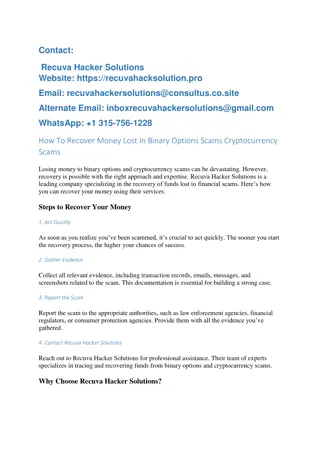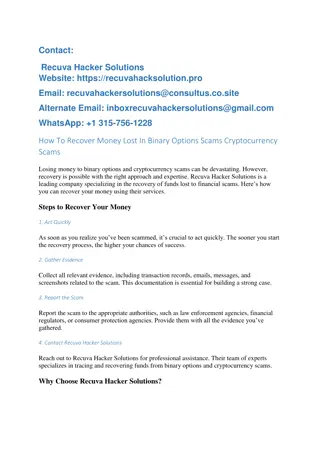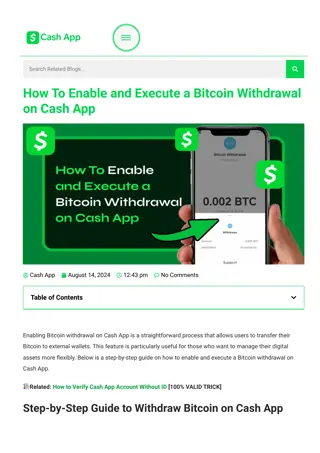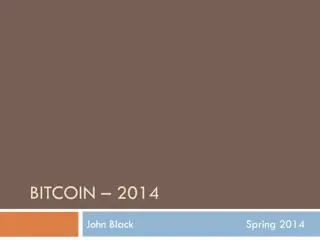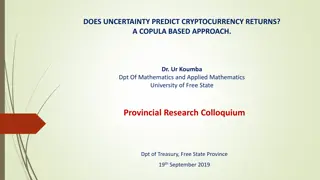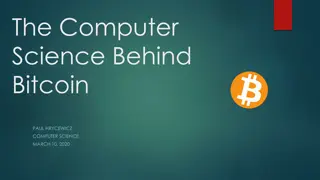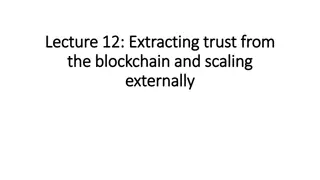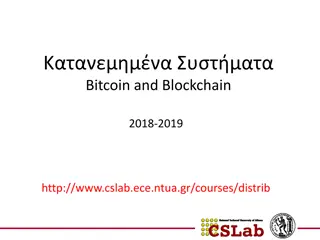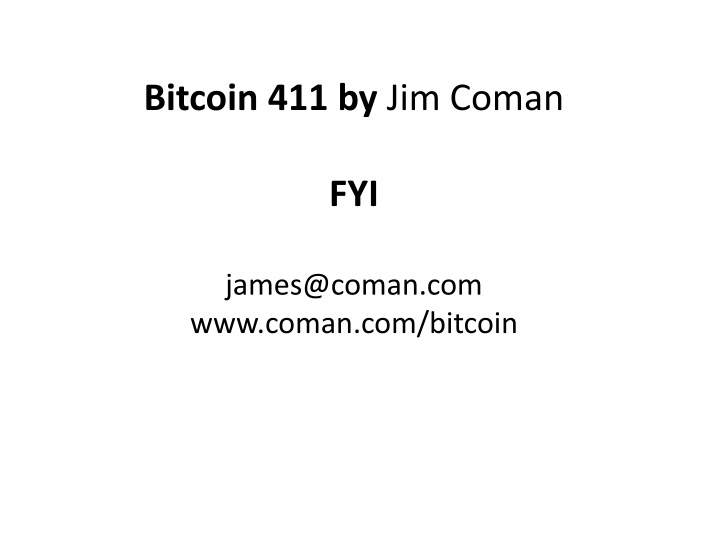
Bitcoin: An Overview of the Cryptocurrency Ecosystem
Discover the world of Bitcoin, a global digital currency revolutionizing finance since 2009. Learn about its decentralized nature, open-source protocol, and the role of miners in securing transactions. Explore the genesis story of Bitcoin and the community of core developers driving its innovation. Delve into the basic mechanism behind Bitcoin transactions and the significance of the blockchain. Uncover the mission of the Bitcoin Foundation in representing this groundbreaking technology.
Download Presentation

Please find below an Image/Link to download the presentation.
The content on the website is provided AS IS for your information and personal use only. It may not be sold, licensed, or shared on other websites without obtaining consent from the author. If you encounter any issues during the download, it is possible that the publisher has removed the file from their server.
You are allowed to download the files provided on this website for personal or commercial use, subject to the condition that they are used lawfully. All files are the property of their respective owners.
The content on the website is provided AS IS for your information and personal use only. It may not be sold, licensed, or shared on other websites without obtaining consent from the author.
E N D
Presentation Transcript
Bitcoin 411 by Jim Coman FYI james@coman.com www.coman.com/bitcoin
Bitcoin Is a global currency (symbol BTC) Very different from fiat currencies Around since January of 2009 Not issued by any entity Peer-to-peer / decentralized Trading over the internet Protocol is open source Somewhat anonymous Protected by strong encryption (cryptoCurrency) If you know the secret account number the coins are yours People who transmit transactions are called miners The maximum number of Bitcoins will be about 21 million A bitcoin is a unit of measurement Not completely illegal yet Not a scam or get-rich-quick scheme May change money forever
The Basic Mechanism Transactions are published to the Bitcoin P2P network Miners (computers) compete to solve a proof-of-work problem on average every 10 minutes The winning miner publishes a summary of recent transactions in a block Miners are rewarded with new coins for having published a valid block Blocks are linked to previous blocks, creating a block chain The value of every account is evident on the blockchain Everyone is expected to know the whole blockchain
Genesis Story The original version of the Bitcoin-QT program was apparently written and published by a person going by the name Satoshi Nakamoto. Some time after starting up the software, Mr. Nakamoto stopped communicating with the developers who took over the project. Nobody knows who Satoshi really is, but his English is really good as well as his programming Satoshi owns nearly 1M bitcoins He/she delivered the Bitcoin software with some incredibly insightful design decisions, but has so far declined to take credit. The software is open source and royalty free
There are Core Developers The developers who wrote the core Bitcoin-QT program are still mostly working on the software They are passionate about Bitcoin There are many other developers and tools that emulate protocol Higher-security wallets Miners Exchanges Currency exchangers/transmitters Nobody is really in control but some people have a lot more influence than others It is possible for developers to alienate themselves and become irrelevant
There is a Bitcoin Foundation Tries to represent Bitcoin Non-profit Modeled after Linux Foundation Fragile coalition of interested parties Pays the developers Small disagreements have led to calls for a new organization Way too cozy with the US government One member has been arrested so far (Silk Road)
Physical Coins You may have seen pictures Some of the pictures are of just play money They are not real Bitcoins but Casascius coins are supposed to be tradable for Bitcoins They are not a good way to hold Bitcoins Some guy in Utah makes them (Casascius) They have a number inside! The US Government (FinCEN) shut Casascius down
Bitcoin Wallets The term Bitcoin wallet refers to a file that contains the number or numbers of accounts that hold money There is also wallet software for managing accounts and transactions Since Bitcoins are valuable, wallets should be encrypted The secret numbers can be printed, generally as a barcode Printed Bitcoin values may be Locked up for security s sake Held as a backup to an electronic wallet Used as paper money
Features of Bitcoin All-electronic Provable value Fast transactions Low-cost transactions Divisible down to 0.00000001 BTC No third-party trust required Uncontrollable (Decentralized) Irreversible trades No double-spending Some anonymity (pseudonymity) Inflation resistant Deflationary (Maximum of 21M issued) International Widely accepted as a currency
Uses For Bitcoin Convenient online purchases Tips and donations Micro-payments Transactions that must be irreversible When information is transferred When an irreversible action is performed Embarrassing transactions Black-market transactions A store of value Investment A place to hide money Gambling Ransom Escape currencies that are in trouble International transactions and financing Buying foreign goods (currency lingua franca) Paying foreign employees
Comparison to US Dollar US Dollar (Cash) Backed by United States? Controlled by US Primarily US-only Created by government Supply controlled by politics Easy to steal by muggers Hard to steal by hackers Hard to transmit Hard to trace Non-refundable Used for crime Bitcoin Backed only by other users Controlled by users International Created based on work done Fixed number issued Hard to steal by muggers Easier to steal by hackers Easy to transmit Hard to trace Non-refundable Used for crime
Comparison to Gold Gold Backed by itself? Internationally accepted Supply controlled by miners Difficult/expensive to store Not easy to divide Difficult to use for transactions Can make jewelry out of it Easy to steal by muggers/invaders Hard to steal by hackers Hard to trace Non-refundable Bitcoin Backed only by other users Internationally accepted Supply is fixed Easy to store Easy to divide Easy to use for transactions Easy to make backups Hard to steal by muggers/invaders Easy to steal by hackers Hard to trace Non-refundable
Divisibility 1000 MilliBits = 1 BTC MilliBits is abbreviated mBTC For the time being, sandwiches are likely to be priced in millibit If Bitcoin are eventually worth $1,000,000, the lowest amount of money you will be able to transact is $0.01 worth
Reversible Transactions are Good Take the form of chargebacks Reversibility protects consumers by allowing for an authority (ultimately the government) to mediate transactions Protection from unscrupulous vendors Recovery from identity theft Accidental transfers can be fixed Although they are expensive, most people demand reversible transactions from their governments The US government thinks chargebacks are important In the US, nearly all non-cash transactions are reversible
Reversible Transactions are Bad They allow vendors to get scammed, increasing costs for everyone Require extensive work by vendors to coordinate Require extensive government oversight Obviates the need for extensive consumer data collection for credit checking Expensive and slow Prevents micro-payments Locks the poor out of many credit transactions
Irreversible Transactions Bitcoin transactions are all irreversible But, for some transactions, people don t want the baggage of the government oversight If you use banknotes or coins, you are familiar with irreversibility
Anonymity Bitcoin provides some anonymity (pseudonymity) Bitcoin addresses are like numbered bank accounts with a password The flow of money from address to address is completely public You can try to deny that you have BTC You can try to deny knowing where BTC went There are ways to increase anonymity
Silk Road Website A black market website that began on the TOR network starting in February of 2011 Bitcoin predates Silk Road Transactions are paid for with Bitcoin Uses an escrow system to reduce abuse Looks like eBay, but most things are illegal most notably, drugs Shut down by the FBI on 10/2/2013 and a suspected leader (Dread Pirate Roberts) was arrested Many millions of dollars worth of BTC were confiscated from people all over the world, even if they broke no laws On 11/6/2013 the website re-opened as 2.0, apparently with new management, but he calls himself DPR Silk Road is only the most successful marketplace for black market goods. There are others
The Technology Behind BTC Hashing (double-SHA256, RIPEMD-160) Proof-of-work (hashcash proof) Dual key encryption (Elliptical Curve Digital Signature Algorithm, Merkle Trees ) Peer-To-Peer Networking (similar to IRC Internet Relay Chat)
Hashing Hashing is applying an algorithm to find a short number (digest) of a block of data A checksum is an example hashing algorithm Every time you apply a hash to some data, you get the same hash number Hashes are one-way. If you have the data, you can find the hash. But, if you have the hash, you can t figure out the data. Hashes are useful for verifying data
Checksum (type of hash) Add up numbers Take the least significant digits Example: 7 7 3 4 2 5 9 0 0 6 43
Checksum as Hash Checksums are a bad (but easy to do) hash SHA256 is a secure hashing algorithm that produces 256 bits of output (equivalent to a 78-digit number) A checksum doesn t care about the order of the numbers With SHA256, any tiny change to the data being hashed will completely change the output hash value
Proof-of-Work Hashcash algorithm designed to prevent spam A hash is an apparently random set of 256 bits Every time you change something being hashed (for example, with a nonce) the hash completely changes There is a 50% chance the first bit might be 0 If you change the thing-to-be-hashed a little bit, you could try a few times and get one with the first bit of 0 First 2 bits: 25% First 10 bits: 0.0977% Find a hash with the first 63 bits as 0 (0.00000000000000001%), and you can publish a block and win 25 Bitcoins
Dual-key Encryption Fundamental to understanding virtual currencies Encrypting with a password is single-key Dual-key encryption uses two keys If one key is used to encrypt, the other key can be used to decrypt And vice-versa The key that encrypted CANNOT decrypt
Single Key Encryption A key (like a password) can encrypt data Key Unencrypted data
Single Key Encryption Use the key to encrypt some data Key Unencrypted data Encrypted data
Single Key Encryption Use the same key to unencrypt Key Unencrypted data Encrypted data But, I have to give away the key And, I have to transmit that key
Dual-key Encryption There are two keys (like special passwords) These keys are big numbers Key 1 Key 2 Unencrypted data
Dual-key Encryption Keys are generated in pairs. They go together Key 1 Key 2 Unencrypted data One key can t be used to find the other
Dual-key Encryption Encrypt with Key 1 Key 1 Key 2 Unencrypted data Encrypted data
Dual-key Encryption Decrypt with Key 2 Key 1 Key 2 Unencrypted data Encrypted data
Dual-key Encryption Encrypt with Key 2 Key 1 Key 2 Encrypted data Unencrypted data
Dual-key Encryption Decrypt with Key 1 Key 1 Key 2 Encrypted Unencrypted
Dual-key Encryption If you only have one key, you can t unencrypt your own data. Key 1 Encrypted Unencrypted
Private and Public Keys Although keys are symmetrical, usually one key is kept private, while the other one is considered public. Private Key 1 Key 2
Private and Public Keys If you want someone to sent you an encrypted file, tell them to use your public key to encrypt it. That way, nobody (not even the person who encrypted it) can read the encrypted data, except you. Private Key 1 Key 2
Private and Public Keys And, if you want to send someone a file so only they can read it, you can just use their public key. It s probably on their website even. Private Key 1 Key 2
Digital Signing Digital signatures prove that data came from the person with the private key For me to sign some text Do a hash of the text Encrypt the hash with my private key Send the encrypted hash with the text To prove that I signed it Do a hash of the text (same as I did) Unencrypt the encrypted hash with my public key Check that it matches the calculated value
What If I Lose My Key? The blockchain will store your address forever in case you later find it Ask Buddha for help The real number of Bitcoins will be less than 21 million because some of them are already lost
Peer-to-Peer Bitcoin originally used Internet Relay Chat When a peer starts up, they get a list of other peers and go looking for a few peers who aren t so busy Peers share information about recent transactions and historical blocks Blocks are verified with Merkle tree signature
Threats to Bitcoin Competing currencies (Network effects) Blockchain forking due to philosophical conflicts Government attacks Denial of service attacks (Probably temporary) Hackers stealing currency Unrecoverable bug in the protocol Cryptography breakthrough (quantum computers?) Loss of confidence due to volatility Early adopters dumping Redlisting Processing power takeover Pressure from Visa/MasterCard Pressure from Internet providers Crushing increase in volume Selfish Miners problem Mutable transactions Byzantine Generals Problem Maybe lack of regulation really is bad Maybe free markets/capitalism just don t work
Regulation of Bitcoin A lack of regulation is preventing big institutions from entering the market Bitcoin is a distributed peer-to-peer system (hard to seize) Bitcoins aren t even tied to it s current network protocol Bitcoin is mostly not in the US there are no major exchanges in the US To stop bitcoin trading, the US will have to be ON your computer Blocking the US from Bitcoins will hinder our participation in a possible technology revolution; American companies will lose contracts America has an established network of drug dealers Paying for drugs with bitcoin makes a lot of sense Accepting bitcoins for drugs makes a lot of sense Drug dealers are probably going to have Bitcoin for sale Organized crime wouldn t turn down a new way to make money (Bitcoin trade) It is possible to curtail legal usage of Bitcoin within dedicated countries, but very difficult to catch bitcoin criminals Bitcoin can adapt around regulation America already has $1.5 Trillion cash overseas. How did it get there? Pandora s box is already open Virtual currencies pose a credible threat to the ability of sovereign nations to govern
Bitcoin is hard to regulate because it is: Decentralized Global Flexible Popular
The Peoples Republic of China Like some Americans, some Chinese have a desire to hide some of their wealth The Chinese government probably won t ban Bitcoins Are Bitcoins worse than USD to them? Like the US, the regulatory environment in China is ambiguous Chinese people (possibly moreso than Americans) like to gamble Chinese citizens are already moving into Bitcoins in a big way Some of the biggest exchanges are in China Chinese exchanges publish fake trading information More full nodes are running in China than any other country Chinese people can buy Bitcoins with Renminbi or USD Chinese people hold a LOT of USD China won t have much sympathy if the US bans bitcoins
Mining Byproduct of publishing the blockchain This is the way new Bitcoins are created Miners publish blocks on the blockchain As a reward for publishing blocks, they get to keep Bitcoins. (50 for the first 4 years, 25 now, halving every four years) Miners also get transaction fees Race to find a conforming hash every 10 minutes Don t do it (unless you have cash, time, and an underutilized electrical engineering skill) Incredibly competitive Risky High upfront investment Technology is changing rapidly Now requires specialized hardware (ASIC chip) Miners reasonably must join a guild The combined computing power of the miners is thousands of times more powerful than the most powerful super computers in the world
How Bitcoins are Created Every 10 minutes (average), miners try to solve a proof-of-work problem The first one to solve the problem publishes a block on the blockchain that includes all transactions from the last 10 minutes In 2009, the reward for publishing a block was 50 Bitcoins. Now it is 25. In 2016 it will be 12.5 Bitcoins With the constant halving, eventually there will only be about 21 million Bitcoins
How Bitcoins are NOT Created You can t pay to create extra coins. They can only be mined There is no central bank to make them The developers can t add extra Bitcoins. Other users would rebel and not take the new version of the software (Litecoin) Miners can t mine extra or faster in response to market forces

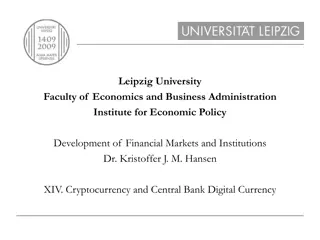
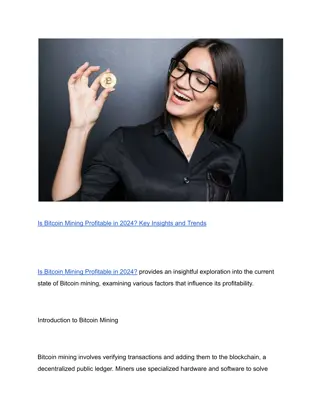
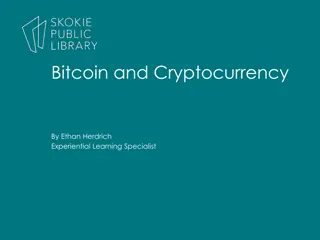
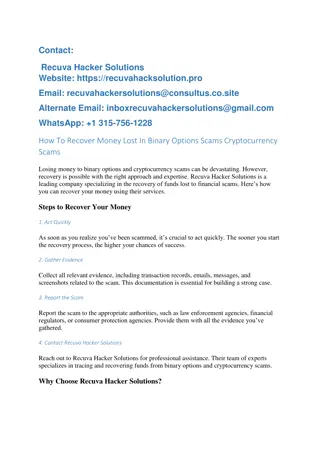
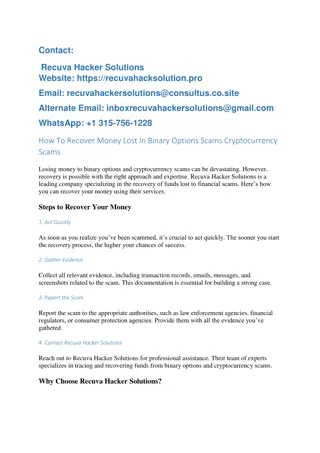
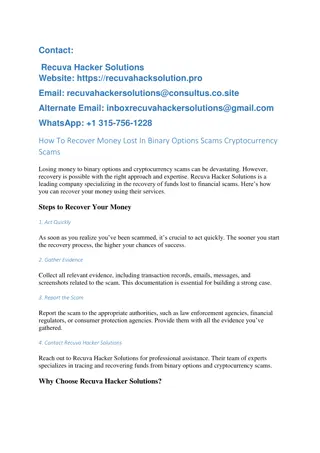
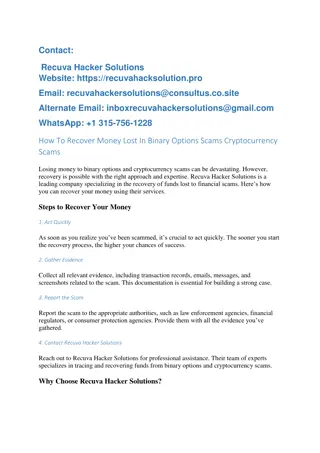
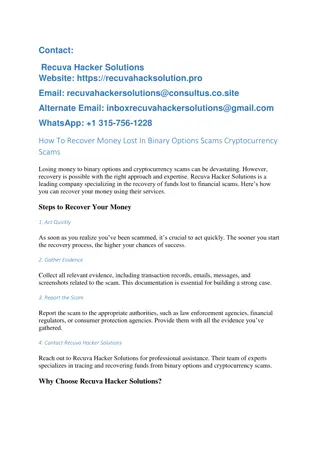
![101 Reviews How to Recover Lost Bitcoin [Scammed/Stolen Funds]](/thumb/153354/101-reviews-how-to-recover-lost-bitcoin-scammed-stolen-funds.jpg)
